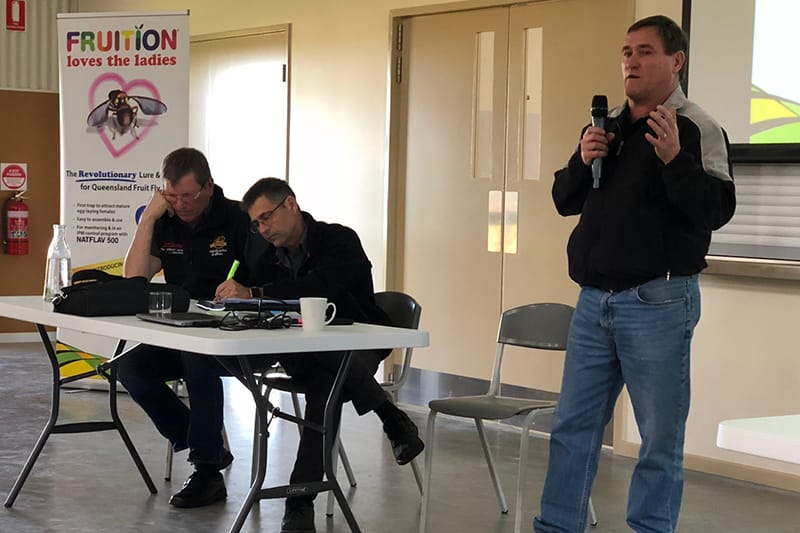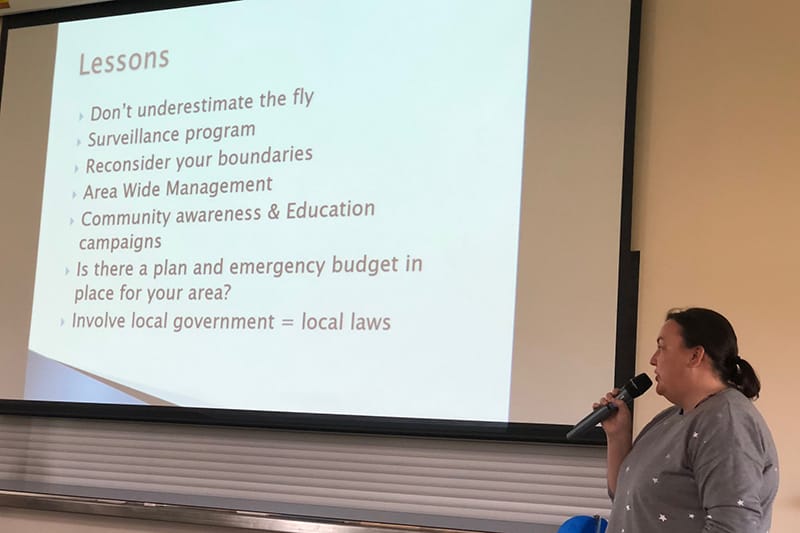23 August 2018
Interstate fruit fly speakers impart key learnings
Interstate fruit fly speakers impart key learnings
23 August 2018
Interstate growers have imparted their key learnings and experiences in fruit fly management to a workshop of 60 attendees in The Riverland, South Australia.

Around 60 growers attended the fruit fly workshop in The Riverlands, South Australia
Growers, technical staff and grower liaison officers were among the key attendees of the workshop, which aimed to educate and provide information to grower members on fruit fly related issues. Citrus SA Committee Chair, Steve Burdette, said it was a space where growers could ask questions and enter into discussion freely.
Graeme Hardwick from Agnova spoke about Queensland fruit fly and its life cycle, current interstate management strategies, the damage it causes and much more. Andrew Finlay, a stonefruit grower and sheep farmer from Stanthorpe in Queensland added valuable information about how he deals with the pest, which is native to his area. Other interstate speakers included Bill Robinson from Mildura Fruit Company and Darren Minter from Minter Magic.
“Interstate growers have been working with Qfly for quite a while and their messages, combined with the other speakers, were very practical and informative,” Mr Burdette said.
“The discussion helped to highlight the seriousness of the situation and the fact that we need to take action and take ownership.”
In one session, attendees heard about Qfly outbreaks in Swan Hill (2012) and Lake Boga (2014), where growers were caught unaware. The lessons learned were described by stone fruit grower, Joelene Williams, as
- Don’t underestimate the fly
- Have a good surveillance program
- Monitor your boundaries
- Introduce area-wide management when you can – especially with orchard hygiene
- Make sure the community is aware and educated
- Have an emergency budget in place
- Involve local government
During a strategy session, focus was placed largely on area-wide management practices.
“Area-wide management consists of many different control strategies and they could be clinical, they could be trapping, the release of sterile flies, or orchard hygiene – there are a number of factors involved,” Mr Burdette said.
“Orchard hygiene is a big one. For example, there is a misconception that fruit fly larvae preside in the soil, but that is actually incorrect. They preside in the fruit and when you have dropped fruit, that could be a problem as mature larvae leave the fruit and burrow into the top 25-50mm of the soil where they change to pupae.”
“We’re operating under an International Code of Practice in a Pest-free area (PFA), so it’s important to understand all control factors and identify which control measures we can and can’t consider within the PFA so that we don’t jeopardise that status.”
You can find out more about fruit fly control from Plant Health Australia, PIRSA or the PIRSA fruit fly hotline (1300 666 010).

From left: Michael Trautwein, Jason Size, Summerfruit SA, Steve Burdette, Citrus SA chair.

Stone fruit grower, Joelene Williams, shared the lessons learned from past fruit fly outbreaks in Victoria.
Membership
You are not logged in
If you are not already a member, please show your support and join Citrus Australia today. Collectively we can make big things happen.
